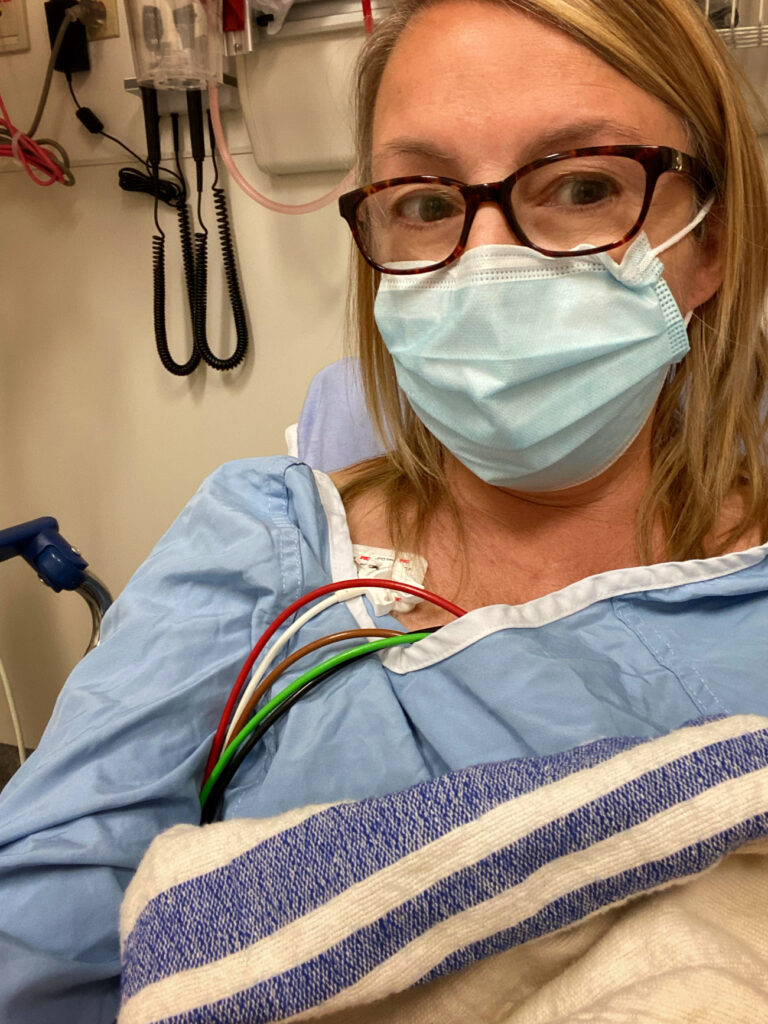At some point, we’ve all experienced it: Everything’s going along great. The bills are paid. Your senior dog made it to see another day. The cutlery came out of the dishwasher shinier than ever. Then WHAM! Life turns around and punches you in the gut.
Or, in my case, the leg.
It all started a couple of weeks ago when I awoke in the middle of the night with a completely numb leg. You know the feeling. It’s usually more of an annoyance than a worry. You just have to wait patiently for the blood to start flowing again and the pins and needles to take over before everything returns to normal.
That night, to get that blood flowing, I got up and walked around for about twenty minutes, but the feeling never fully returned. It was unsettling, but I’ve suffered from tingly extremities many times over the years, so I decided to get back into bed and try to sleep it off. That’s when all my limbs started tingling. But what did I do about it? I promptly fell back asleep, which is a miracle considering the level of anxiety I’d reached by then.
When the tingling still hadn’t gone away by morning, I called 811 to speak with a registered nurse, mainly for reassurance. I’d been expecting her to say something like, “It doesn’t sound serious, but you should book an appointment with your doctor.”
But instead, she said, “Hang up and call 911 immediately.”
Well, if that doesn’t send a person spiralling into blind panic, I can’t imagine what would. When the ambulance came, everything checked out, but they recommended I go to the hospital for more thorough testing, and away we went.

Ten hours later, I emerged from the ER department with a working diagnosis of “suspected TIA.”
I was also told to start taking 81 mg of Aspirin and was booked into the Stroke Prevention Clinic the following week.
If you aren’t aware, TIA stands for transient ischemic attack, which is the medical term for a ministroke. Suffice it to say, after getting home and reading countless articles about the condition, I fell into deep anxiety about my health. I believed I was a ticking timebomb. My mind repeatedly went to the idea that any minute I was about to have a full-blown stroke that would leave me impaired mentally or physically . . . or both. This, despite the fact that my blood tests, head CT, and carotid Doppler ultrasound were all normal.
My fear was justified, though. According to this article from the Mayo Clinic, TIAs are known precursors to full-blown strokes. It states that “About 1 in 3 people who has a TIA will eventually have a stroke, with about half occurring within a year after the TIA.”
“About 1 in 3 people who has a TIA will eventually have a stroke, with about half occurring within a year after the TIA.”
-Mayo Clinic
So, while I awaited my appointment at the Stroke Prevention Clinic, I focused all my energy on not panicking. It wasn’t easy. I just couldn’t shake the lingering feeling of dread.
In fact, I was so distraught that I landed in the ER department two more times.
The first time, I was in there for eight hours. There, a completely different doctor again defaulted to a diagnosis of TIA and started me on a blood thinning medication. I still hadn’t been to the Stroke Clinic, but in the meantime, my family doctor sent me a note to say he noticed I’d been in the ER. After a number of messages back and forth (until 9 pm Friday night . . . Love my doctor!), he said what I was describing was not typical for TIA.
The following Wednesday, I finally had my appointment with the SPC, and the neurologist agreed it didn’t sound like a TIA. He told me to stop taking the blood thinner immediately, in essence, reassuring me that I was out of the woods.
But it got me wondering how two different ER departments could get it so wrong.
Well, for one, I’ve since noticed the reports didn’t mention three key details:
- That I’d recently started a new exercise program and that I’d gone pretty hard the day before this all started
- That I’d fallen asleep on my stomach with my leg hanging off the bed, and when I woke up, it was numb
- That the release date for my new book was looming and that I’d been under pressure to get it all done.
In retrospect, I now believe those three things combined with the upsetting 811 call sparked a five-alarm panic attack. Apparently extreme anxiety can cause numbness and tingling in the limbs and face which definitely checks those boxes in my case—symptoms that persist as I write this post sixteen days later.
That said, I still don’t have answers for the persistent numbness and tingling. Could it really be prolonged anxiety? I don’t feel anxious. All this turmoil aside, I’m actually quite happy and content with my life, and I’m super excited about my upcoming book release. As mentioned though, there was a time, right before this all happened, when I was stressing about finishing that book. The neurologist pointed out that the body can’t tell the difference between good stress and bad stress. So, maybe that’s all it was.
I hope that’s all it was.
In the meantime, the doctors all agree I should continue my fitness regime, go for a thirty-minute walk every day, do deep breathing exercises when I start to feel anxious, and try not to stress so much about my writing endeavors. That last one is hard, but I’m working on it.
Have you ever had a health scare that just about put you over the edge? What about the “good stress” in your life? Do you find it just as anxiety-producing as bad stress? If you’re comfortable sharing your story, I’d love to hear from you. Comment below or send me a message. I always reply, though these days, perhaps not right away.
